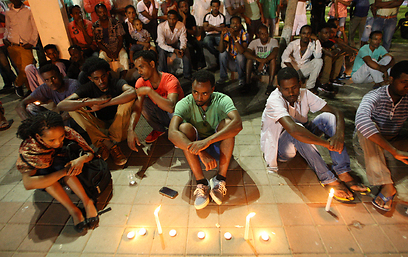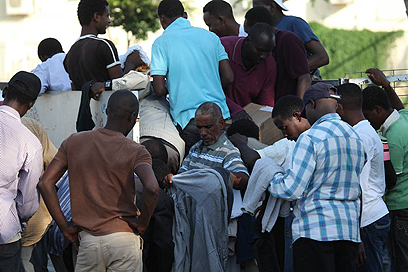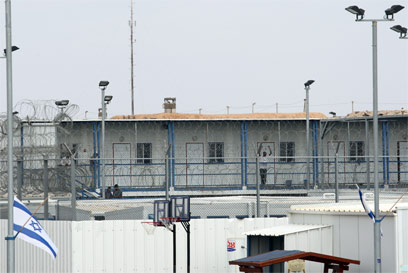
Asylum seekers: We beg the Israeli government – protect us
Eritrean refugees hold press conference in protest of 'willful emigration' directive, allegedly allowing detained asylum seekers to leave voluntarily. 'In Israel they call it willful emigration, but with no alternative, there is nothing willful about it. To deport us to Eritrea is to sentence us to death,' migrant says
According to organizers, contact with those who returned to Eritrea has already been lost and their whereabouts are no longer known, while others have already been jailed or have been forcefully enlisted into an army service indefinitely.
Related stories:
- Dozens of Eritreans deported by 'own accord'
- 200 Eritreans mark World Refugee Day in Tel Aviv
- AG frees Sudanese actor suspected of theft
"Our lives and the lives of our children are in danger," a representative of the community warned regarding the fate of those who will return to Eritrea as part of the new directive – according to which infiltrators and asylum seekers who are held in detention facilities can choose to leave Israel if they return to their home country.

Press confrence (Photo: Motti Kimchi)
"Our brothers were expelled from the Israeli prison where they were detained indefinitely and were completely in the dark regarding their fate," said Davit Demoz, an asylum seeker who arrived in Israel three years ago from Eritrea.
"In Israel they decided to call it 'willful emigration' – but when there is no alternative, there is nothing willful or free about it. We don't believe they really agreed to this. The government of Israel took advantage of their (the detainees') condition and now their lives are in danger. To deport us to Eritrea is to sentence us to death," he said.
"We beg the Israeli government – protect us," Demoz pleaded.

Refugee Day in Tel Aviv (Photo: Yaron Brenner)
At the end of June, Attorney General Yehuda Weinstein authorized the new directive, which has since garnered the criticism of human rights groups which argue that it is impossible to claim that decisions taken by jailed refugees constitute free will.
Representatives of the Eritrean community launched a letter to Prime Minister Benjamin Netanyahu on Sunday, requesting that the new directive be canceled and that the deportation of asylum seekers back to Eritrea be stopped.

Deportation 'sentences us to death' (Photo: Motti Kimchi)
According to Hebtum Mahar, another Eritrean asylum seeker, the majority of those who returned to Eritrea are currently detained and the fate of the rest is unknown.
"Refugees who return are held in a Facility #5, adjacent to the Asmara (Eritrea's capital) airport. It is known as one of the toughest facilities in the country. They're interrogated and even tortured there, because in Eritrea, lodging an asylum request in an another country is considered treason," Mahar said.

Saharonim detention center. Negev. (Photo: Amit Megal)
"During the last decade, there have hardly been any deportations of Eritreans, especially in democratic and developed countries," Mahar stressed. "Most countries understand that you cannot deport an Eritrean back to his country, but the State of Israel has failed to understand that."
Hunger, mass enlistment
Reports published by various international organizations and Western governments regarding the situation in Eritrea paint a grim picture of a dictatorship with little regard for human rights and in which the last free elections were held only 15 years ago.
According to some of the reports, prison terms without trial are prevalent, as is lack of freedom of movement, hunger, a general lack of welfare and public services, and mass enlistment into the army for an indefinite period of time.

55,000 refugees in Israel (Photo: Motti Kimchi)
Emanuel Demena, another Eritrean asylum seeker in Israel, said he was forced to serve a three-year prison sentence in an Eritrean prison after requesting to be released from 12-year mandatory military service.
Eritrea is considered to have one of the highest percentage of refugees, and in accordance with international law, Israel is banned from deporting Eritrean nationals, despite the fact that the two countries have diplomatic relations.
On the other hand, in recent years, Israel has failed to examine the validity of asylum requests, and senior Israeli officials contend that the situation in Eritrea is far better than reports claim and that the majority of asylum seekers from the country are in fact migrant workers who infiltrated into Israel in search of employment.
"In Eritrea, anyone who thinks differently or expresses a different opinion is arrested and then disappears," Demoz noted. "The families don't know where their loved ones were taken and whether they will ever see them again. Also, everyone must enlist into the army without knowing when they will be released. In the army, soldiers are the government's slaves."
An August 2011 report penned by the British government determined that Eritreans who return to their country were arrested and detained without trial, and forced to undergo torture, which in some cases resulted in death.
According to several reports, the number of asylums seekers who receive positive responses to their asylum requests is above 80% in European countries. The only countries to refuse refugees were Libya, Egypt and Malta, and the whereabouts of those refused refugee status is unknown.
According to Israeli Population, Immigration and Border Authority (PIBA), there are currently 55,000 infiltrators and asylum seekers living in Israel. Some 40,000 of them are from Eritrea and the remaining 15,000 are from Sudan.
Since June 2012, according to the amendment to the Infiltration Prevention Act, some 2,000 such asylum seekers and infiltrators are held in detention facilities to which they were admitted without trial for a period of three years.
- Receive Ynetnews updates directly to your desktop










